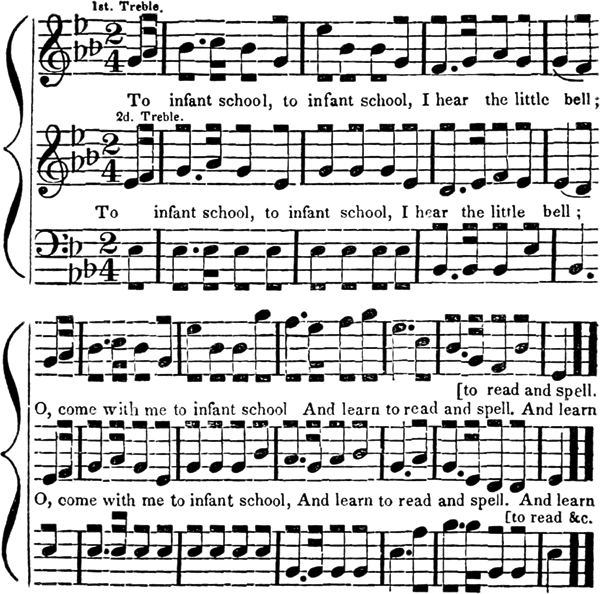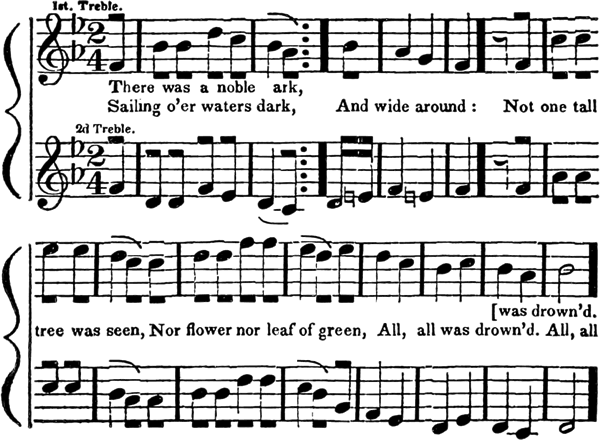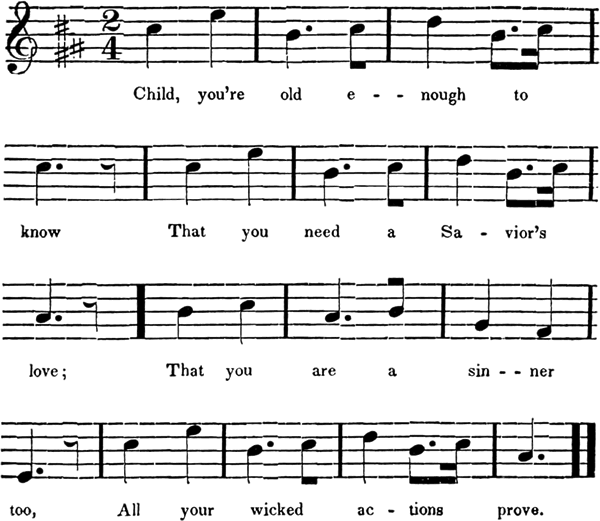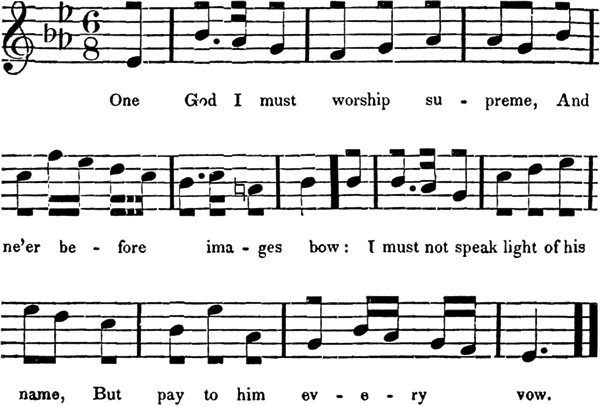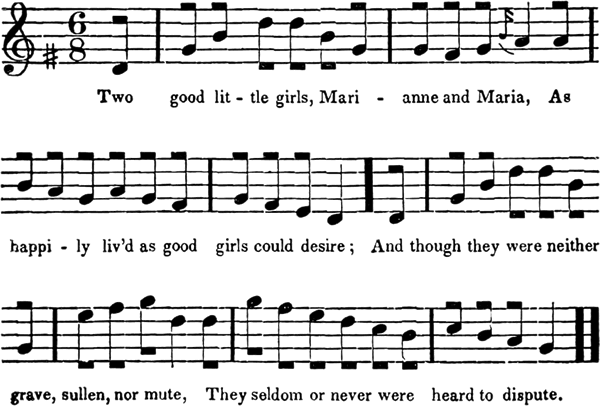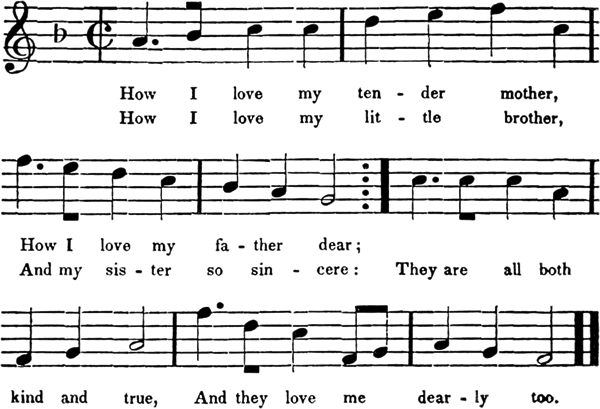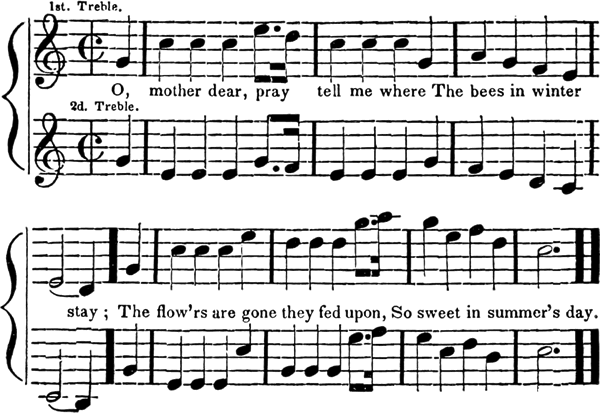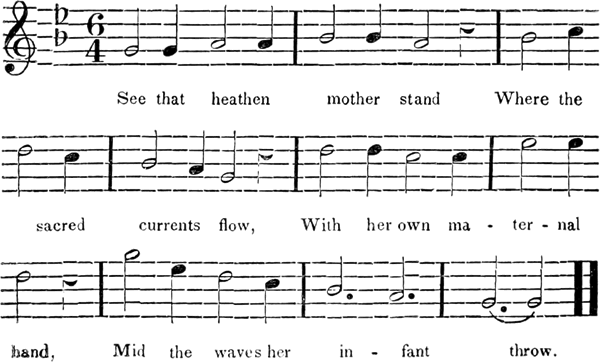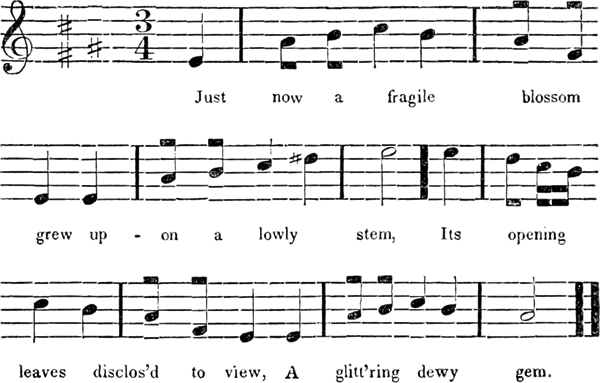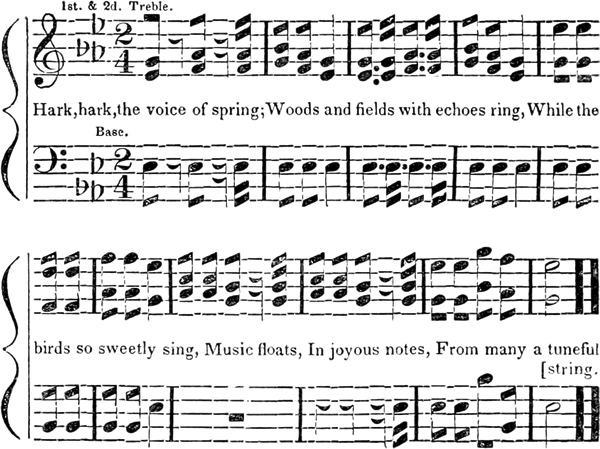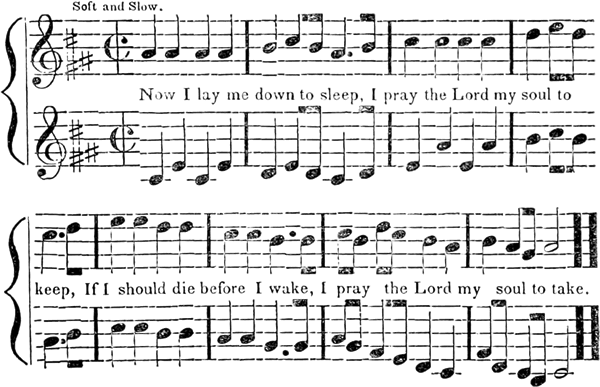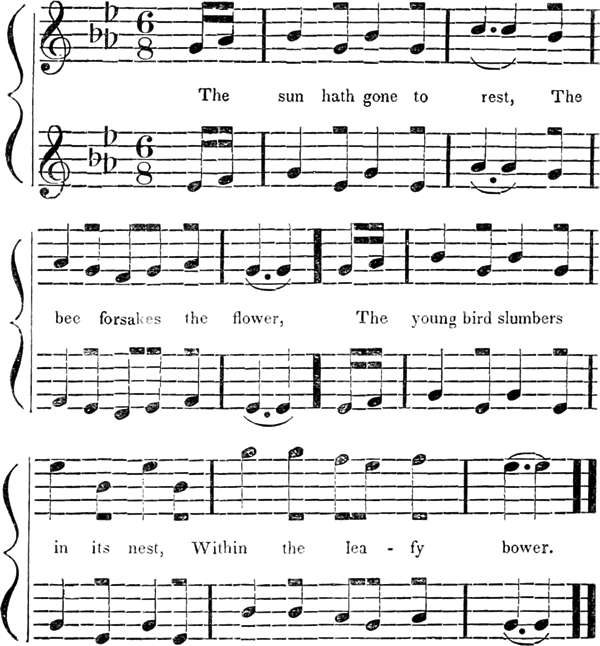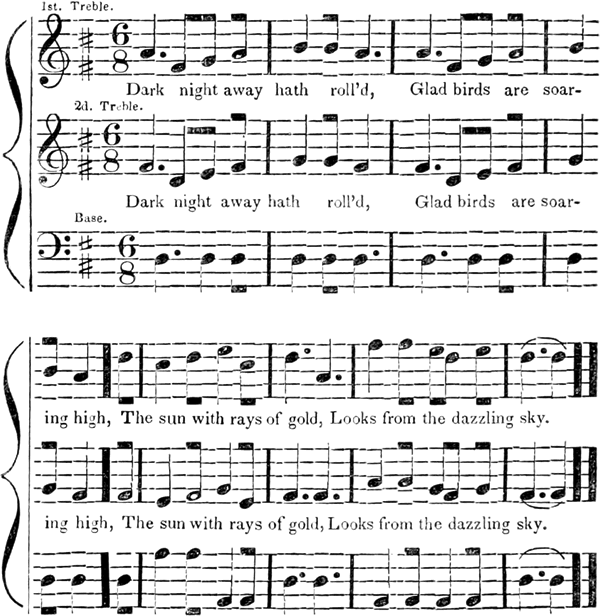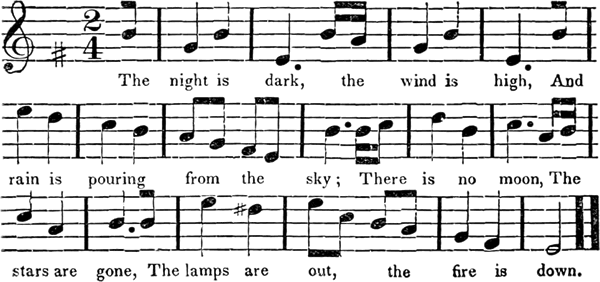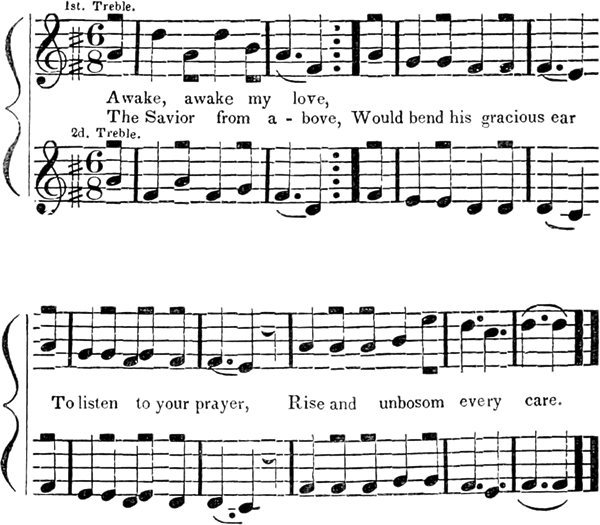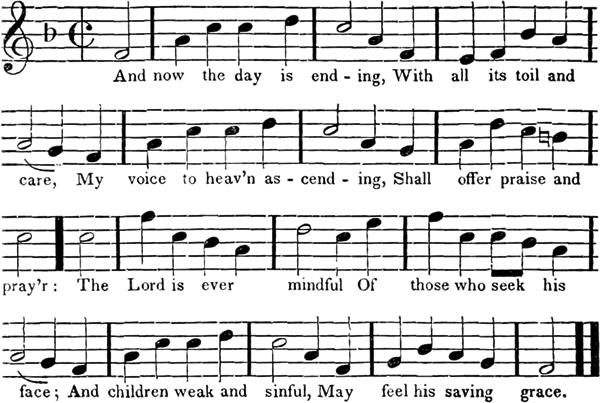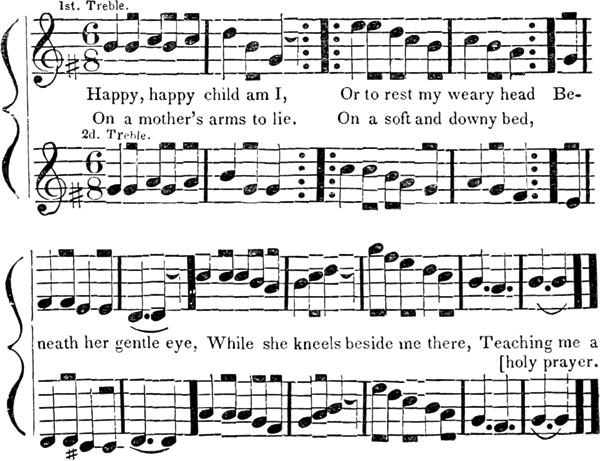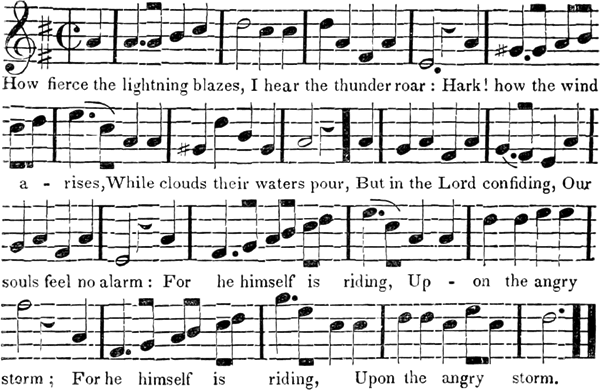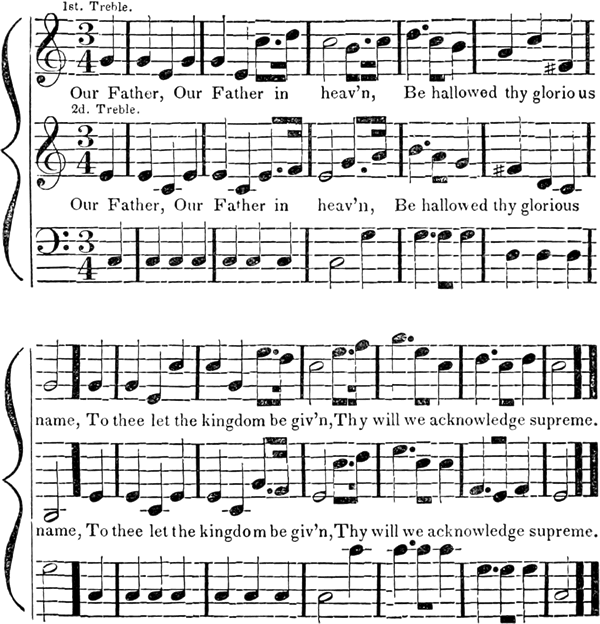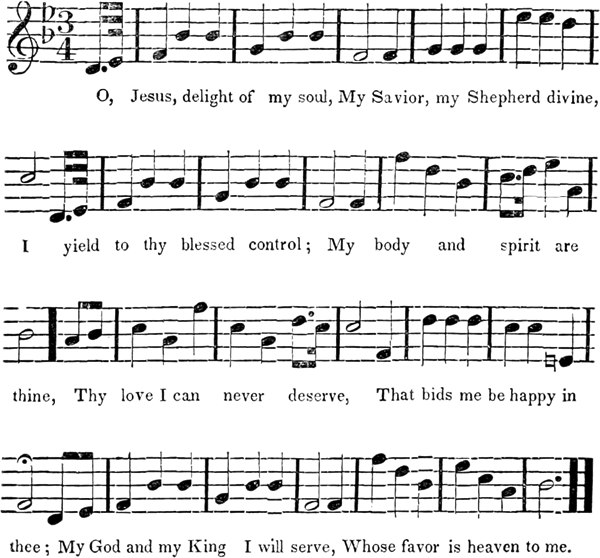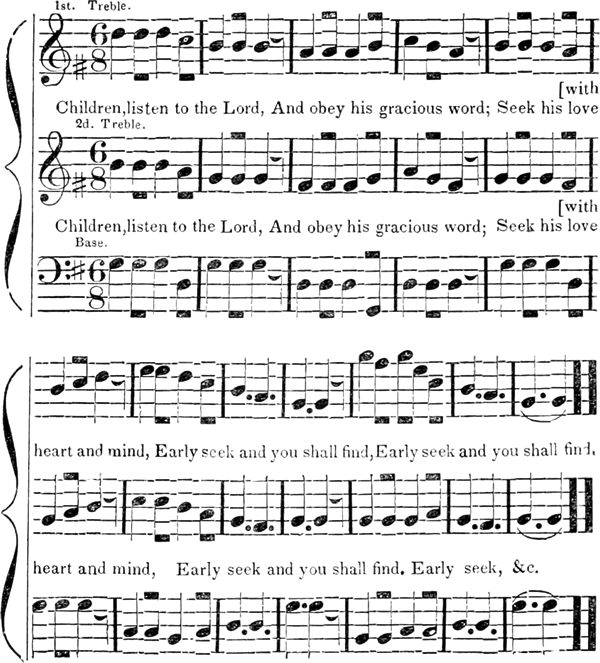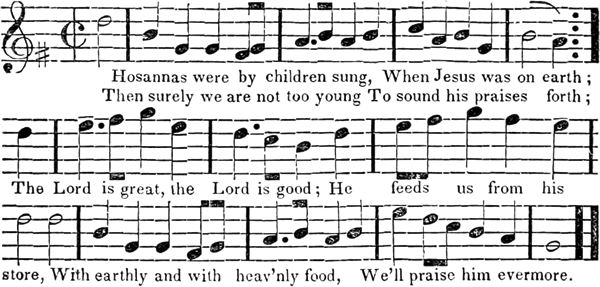The Project Gutenberg EBook of The Mother's Nursery Songs, by Thomas Hastings
This eBook is for the use of anyone anywhere at no cost and with
almost no restrictions whatsoever. You may copy it, give it away or
re-use it under the terms of the Project Gutenberg License included
with this eBook or online at www.gutenberg.org
Title: The Mother's Nursery Songs
Author: Thomas Hastings
Release Date: April 29, 2013 [EBook #42612]
Language: English
Character set encoding: ISO-8859-1
*** START OF THIS PROJECT GUTENBERG EBOOK THE MOTHER'S NURSERY SONGS ***
Produced by Veronika Redfern, David Edwards and the Online
Distributed Proofreading Team at http://www.pgdp.net (This
file was produced from images generously made available
by The Internet Archive). Music transcribed by Veronika
Redfern.
[Pg 1]
THE
MOTHER'S
NURSERY SONGS.
BY
THOMAS HASTINGS,
AUTHOR OF "DISSERTATION ON MUSICAL TASTE"—ONE OF THE COMPILERS
OF "MUSICA SACRA"—"SPIRITUAL SONGS"—"INFANT
MINSTREL," &c. &c.
NEW-YORK:
PUBLISHED BY JOHN P. HAVEN,
148, NASSAU STREET.
——
1835.
[Pg 2]
Entered according to Act of Congress, in the year 1834, by
JOHN P. HAVENS,
in the Clerk's Office of the District Court of the United States for the
Southern District of New York.
[Pg 3]
The author of the following pages was one day conversing
with a lady of some distinction, relative to the importance
of teaching young children to sing, when a question
arose—whether any thing could be done by the mother in
this respect, during the period of the early infancy of her
offspring? This inquiry, with the discussion that ensued,
gave rise to the present publication.
Much, no doubt, can be done in early infancy, on the
mere principle of imitation. Exercises for this purpose
should be exceedingly simple; and, as far as possible,
adapted to the infantile capacity. Great originality will
hardly be expected in such a work as this: yet the materials
here presented are, for the most part, such as have not
before been published. A few extracts, have been furnished
from the writings of Jane Taylor: And for many of the
other little poems, the author is happy to acknowledge his
obligations to several literary friends, among whom are the
Rev. James Alexander, Professor of Rhetoric in Princeton
College, New Jersey, Mrs. Sigourney, of Hartford, Connecticut,
well known as the author of occasional pieces of
great poetic merit, and Mrs. Brown, of Munson, Massachusetts,
the writer of several interesting anonymous hymns
now in general circulation.
The object of the work, as will be readily inferred from
its special characteristics, is to aid mothers in attuning the
voices of their infant offspring, and inspiring them with the
love of vocal music. When the Savior was on earth young
children cried hosanna: and ere he is again revealed in the
glories of the latter day—his praise shall be perfected out
of the mouth of babes and sucklings. Yet they must first
be instructed; and this work should be commenced by
the mother.
[Pg 4]
It is a point now universally admitted among practical musicians, that all
children, the deaf and dumb excepted, may be taught to sing; and that the
difference of natural talent in this respect is, probably, not greater, than in
reference to other departments of education. The faculty in question is never
truly instinctive, but always in a great measure acquired. Nature furnishes
us with organs, and with powers of perception. Cultivation must do the rest.
The fact that so large a portion of the present generation are unable to sing,
is not to be attributed to physical deficiencies, but to unfortunate circumstances
in the history of early education. In countries where music is continually
taught in the primary schools, the children, as a matter of course, all
learn to sing: and the same experiment, wherever it has been tried in our own
country, has led to the same happy result. This circumstance alone shows
the importance of early cultivation. If music is neglected till years of maturity,
it will, in the majority of instances, continue to be disregarded through life.
Infancy is undoubtedly the most favorable period for commencing the work.
The foundation must be laid then if distinguished excellence is ever afterwards
to be attained.
Adults, with voices of a most unpromising character imaginable, have
sometimes, it is true, been taught to sing. The thing in its nature is not impracticable,
but it is very difficult. It requires time and labor and perseverance,
such as few, comparatively, are found to possess. But with young children
the task is neither difficult nor laborious. The principle chiefly employed in
forming the voice is imitation. The child, under favorable circumstances,
acquires the management of its voice in singing just as it acquires in speaking
the accurate pronunciation of the mother tongue. In both cases it is the imitative
pupil of its mother, or nurse. Mothers should think of this, and not neglect
to stir up the musical gift that is within them. Though that gift should
be small, it might at least suffice to initiate the listening child in the practice
of an important art which would afterwards be more successfully prosecuted.
One who wishes to acquire practical skill as a player on a musical instrument,
must of necessity begin by drawing forth such tones or executing such
passages, as can be mastered with the greatest facility; deferring such as are
more difficult to a later period of cultivation. For all the purposes of vocal
training, the mother may regard her infant child as such an instrument, not
doubting but perseverance will accomplish the desired object.
There is a special season in infancy when children are full of mimickry.
Then, a great portion of their daily employment, while in perfect health, is
like that of the mocking-bird, to be imitating every pleasant sound that falls
within their hearing. Their earliest efforts in this respect will necessarily be
rude, but, by constant practice, their talent is found to improve; while, at the
same time they acquire an increasing fondness for the exercise. Does not
nature evidently point out this period as the precise time for making musical
impressions upon the child that will be strong and indelible?
Let no one suppose that the voice is necessarily injured by early cultivation.
If the little one is not induced to sing too much or too loud for its general
health, there will be nothing to fear. Its voice will improve much in proportion
to its practice; and when, in subsequent years, its intonation becomes[Pg 5]
for a little period broken and discordant, it will be sure to be restored in due
time. Every male child, sooner or later, must pass through such a change, as
the unavoidable result of physical changes in the structure or conformation of
its organs. Daily, moderate practice will be the obvious and certain remedy.
Previous to the period of infantile mimickry above mentioned, the affectionate
mother will often have been soothing her child with the voice of song.
When that period arrives, let her continue the practice in melodies as simple
as those of numbers one and two, in part first of this work. And as the child
begins in the smallest degree to play the mimic, let her in turn become the
imitator, so far as to seize upon every note which has resemblance to music,
and thus encourage the child to repeat its efforts. The mother may thus
gradually draw out and form its voice for music, just as she teaches it the
articulations of the native tongue. The latter process she well understands.
She begins with the simplest syllables only, and as she proceeds with those
that are more difficult, the exercise is carefully adapted to the gradual progress
of the child. Nothing is forced. Every thing is made pleasant and amusing
to the little pupil: and the mother at every step is so amply rewarded for her
assiduity, as to feel that her labor is but another name for delightful recreation.
The same course in reference to singing would be rewarded with the same
success. Though the mother should be quite ignorant of the simplest principles
of the science; her skill in minstrelsy would suffice for the work immediately
before her. Let her also frame some simple phrases of melody, that are
very similar to those she notices in the mimickry of her child, gradually heightening
their character as the child improves its vocal powers. All these exercises
perhaps will be inarticulate; and in some cases the child will make more
rapid progress in song than in speech.
Of all the articulations that fall from the unpractised lips of infancy, the first
and perhaps the sweetest that ever greet the maternal ear, are those of ba, pa,
na, ma, ta, da, followed afterwards by their compounds papa, mama, &c.
The mother should not fail to set them to music in some such clauses as these
that follow
A considerable portion of time, it is true, may elapse, before such clauses as
these will be fully understood; and the child perhaps will incline to substitute
other clauses in their place, and thus become its own composer. The only
important point here, is to see that its tones are rendered musical.
In process of time let the musical passages be augmented somewhat after
the following method, observing to sing them in a gutteral and not in a nasal
manner:
[Pg 6]
The process from such passages as these, to such as constitute the first and
second lullabys of this collection will be easy: and thenceforward less skill
in adaptation will be required.
The preceding directions may suffice for the object before us: if followed
with perseverance the child will begin to sing long before it is old enough to
understand the rules of the art; and this, much to its own amusement and to
the gratification of its affectionate parents. Some may doubt the practicability
of the course here recommended; but certainly it is an easy one. Let
them be persuaded to try it faithfully and perseveringly, and the author will
consent to be responsible for its success.
[Pg 7]
PART I.
——
THE CRADLE.
As the songs under this head will be employed by the mother, chiefly in
soothing her infant to sleep, or in mitigating its sufferings in hours of sickness
or distress, it seems not necessary that all the language should be adapted to
the infantile capacity. It may suffice that the words contain certain easy syllables
or phrases, which, by their perpetual recurrence, make strong impressions
upon the ear of the child. The exercise of singing should, however, be
so managed as to afford pleasure to the child: for otherwise its taste will be
injured.
LULLABY.
Lullaby, lullaby,
Do not wake and weep;
Softly in the cradle lie,
Sleep O, sleep.
Lullaby, lullaby,
Hear thy mother's voice;
Softly on her bosom lie,
Then she'll rejoice.
[Pg 8]
SLEEP, BABY, SLEEP.
Sleep, baby, sleep,
No longer weep;
Near thee sits thy little brother,
Close beside thee is thy mother,
Sleep, baby, sleep.
Sleep, baby, sleep,
No longer weep;
Israel's Shepherd watches o'er thee;
No rude danger lies before thee,
Sleep, baby, sleep.
Sleep, baby, sleep,
No longer weep;
Germ of beauty, bud and blossom,
Rest upon thy Savior's bosom,
Sleep, baby, sleep.
Sleep, baby, sleep,
No longer weep;
Life has many a raging billow—
Rest upon thy downy pillow,
Sleep, baby, sleep.
[Pg 9]
HUSHABY.
Hushaby, hushaby,
Baby, do not weep,
On thy downy pillow lie,
Softly, softly sleep.
Hushaby, hushaby,
Now thine eyelids close;
While thy mother sitting by,
Watches thy repose.
Hushaby, hushaby,
Think of no alarm,
Angel spirits round thee fly,
Guarding thee from harm.
Hushaby, hushaby,
Slumber sweet be given;
On thy downy pillow lie,
Precious gift from heav'n!
[Pg 10]
SLUMBER SWEET.
Slumber sweet
Thine eyelids greet
My infant daughter dear:
No footstep rude
Shall here intrude,
Nor stranger shall come near.
Slumber sweet
Thine eyelids greet
Within thy mother's arms;
She little tells
How feeling steals
O'er all thy rising charms.
Slumber sweet
Thine eyelids greet
And gentle dreams be thine;
To thee be given
The bliss of heav'n,
Where cherub angels shine.
[Pg 11]
SOFTLY IN THE CRADLE LIE.
Softly in the cradle lie,
Thy father's hope, thy mother's joy;
Sweetly rest in balmy sleep,
Do not wake to sigh and weep.
Softly in the cradle lie;
A mother's heart thy wants supply;
She can rest if thou repose,
Sweetly then thine eyelids close.
Softly in the cradle lie,
Frail bud of immortality;
Soon thy blossom may unfold
Fragrant mid the harps of gold.
[Pg 12]
O, DO NOT WAKE.
O, do not wake, sweet little one,
The night is dark and drear;
All that a mother could have done,
Has been perform'd with care.
The pillow's soft on which you rest,
And sweetly you have fed;
Still lean upon your mother's breast
Your weary little head.
O, do not wake, sweet little one,
Nor tremble with alarm;
The Hand unseen you live upon
Preserves you still from harm.
[Pg 13]
WELCOME, WELCOME.
Welcome, welcome, little stranger
To this busy world of care:
Nothing can thy peace endanger,
Nothing now thy steps ensnare.
Mother's heart is fill'd with pleasure,
All her feelings are awake;
Gladly would she, little treasure,
All thy pains and suff'rings take.
May'st thou, if design'd by heaven,
Future days and years to see,
Soothe her, make her passage even;
Let her heart rejoice in thee.
May her anxious cares and labors
Be repaid by filial love;
And thy soul be crown'd with favors
From the boundless source above.
Jane Taylor.
[Pg 14]
HOW GENTLY SHE SLEEPS.
How gently she sleeps,
How silent she keeps,
Her breath is as soft as the morn;
While every new grace
In the dear one I trace,
To my bosom in transport is borne.
No sorrow she knows,
This hour of repose,
Nor hunger nor thirst nor disease;
The world with its cares,
And temptations and snares,
Has never invaded her peace.
I've linger'd awhile,
To gaze on that smile,
So sweetly that plays on her lips;
Some innocent dream
Or some heavenly beam,
Is visiting her while she sleeps.
My lov'd one awake,
Thy slumberings break,
My daughter, 'tis time to arise;
Thou joy of my heart,
A lent blessing thou art,
To be given again to the skies.
[Pg 15]
O DEAR ONE.
FOR A CHILD DANGEROUSLY ILL.
O dear one, how sad is that moan,
How languid and sickly that eye;
My bosom responds to each groan,
And echos each deep-breathing sigh.
Those fluttering pulsations I trace,
The anguish that sits on thy brow,
The paleness that covers thy face,
Thy voice that is languid and low.
O dear one, how deep is the grief,
That withers my desolate heart;
Kind Heav'n bring thee speedy relief,
Or thou from thy mother wilt part.
[Pg 16]
O MY PRECIOUS LITTLE GEM.
FOR A FATHERLESS CHILD.
O my precious little gem,
While I hold thee to my breast,
May some heav'n inspiring dream
Soothe thy spirit into rest.
But thy mother's heart is riv'n,
Bitter anguish she must feel;
Nothing but the balm of heav'n,
Can her wounded spirit heal.
Dark the night and dread the hour
When thy father lay so low;
When he felt the monster's pow'r,
Who could tell thy mother's woe!
But, thou image of his love,
May'st in heav'n thy father see;
Ere his spirit soar'd above
'Twas his latest pray'r for thee.
[Pg 17]
SAFE SLEEPING.
Safe sleeping on its mother's breast,
The smiling babe appears
Now sweetly sinking into rest,
Now wash'd in sudden tears:
Hush, hush, my little baby dear,
There's nobody to hurt you here.
Without a tender mother's care
The little thing must die;
Its chubby hands too feeble are
One service to supply:
And not a tittle does it know
What kind of world it's come into.
Full many a summer sun must glow,
And lighten up the skies,
Before its tender limbs can grow
To any thing of size:
And all the while the mother's eye
Must every little want supply.
Then surely when each little limb,
Shall grow to healthy size;
And youth and manhood strengthen him
For toil and enterprize,
His mother's kindness is a debt
He never, never will forget.
Jane Taylor.
[Pg 18]
HUSH, HUSH.
FOR THE SPRING OF THE YEAR.
Hush, hush,
While flowrets blush,
This blossom must repose,
Thy mother's joy,
My infant boy—
No rival beauty[1] knows.
Hush, hush,
On every bush,
While birds are singing shrill;
My little child,
So sweet and mild,
Must now be soft and still.
Hush, hush,
While riv'lets gush,
Refrain thy rising tears,
For every grief,
We'll seek relief,
And soothe thy infant cares.
Hush, hush,
What feelings rush
Within a mother's breast;
Be this her pray'r
That thou may'st share
In heav'n's eternal rest.
[Pg 19]
WEEP NOT.
FOR A SICK CHILD.
Weep not, O little one,
Though thou art very ill,
For thou art not alone
Thy woes to feel.
Each sigh of thine will heave
An anxious mother's breast;
Each accent of thy grief
Will break her rest.
Each tear that thou dost shed
Will cause her grief to flow:
Her heart, since thine doth bleed,
Is bleeding too.
One Hand alone can heal;
That hand is ever near:
O who can doubt His skill—
Or gracious care!
[Pg 20]
MOTHER DEAR, THE BABY CRIES.
Mother dear, the baby cries,
Where is the nurse?
Every thing that sister tries
Makes him only worse.
Come, mother, come;
Dear mother, come!
Every thing that sister tries
Makes him only worse.
Mother dear, the baby cries,
Is he not ill?
Not a thing that brother tries
Ever keeps him still.
Come, mother, come,
Dear mother, come!
Not a thing that brother tries
Ever keeps him still.
Mother dear, the baby cries,
What shall we do?
In the cradle here he lies,
Waiting for you.
Come, mother, come,
Dear mother, come!
In the cradle here he lies
Waiting for you.
[Pg 21]
The songs of this department are introduced chiefly for children who are
just beginning to entertain a few simple ideas and principles relative to things
around them. The mother should commence with some of the easiest songs,
and afterwards, as she proceeds with the more difficult ones, furnish the words
with an occasional comment.
THE MERRY LARK.
Hark, hark,
The merry lark,
Beginning her morning song;
Robin redbreast
Is still in her nest
And silent is her tongue.
No, no,
It will not do,
Though Robin may lie in bed;
"Early and bright
"As soon as 'tis light"
My mother to me has said—
See, see
The busy bee
A going from flower to flower,
Carries a sting,
While under her wing
She holds her honied store.
So, so—
While busy too,
In study or useful work;
In many a sweet
Which we may meet
Some poison'd sting may lurk.
[Pg 22]
UP IN THE MORNING.
Up in the morning, up my child,
See the sun, how bright and mild;
See the dew-drops every one
Glist'ning in the sun:
Time for the dear one up to spring,
While the merry bells do ring.
Quick let me put your clean dress on,
For the night is past and gone;
Now another day is giv'n,
By our Lord in heav'n:
Now when the morning air you feel
To your heav'nly Keeper kneel.
Praise to the Lord for morning light,
Praise for safety through the night,
While the birds are singing all,
On the Lord we call:
Thus in the morning we will praise
Our Redeemer all our days.
[Pg 23]
DAWN OF DAY.
Come, arise from thy sleep,
Through the green bushes peep,
Birds sweetly are straying,
Their bright plumes displaying,
At dawn of day.
Let us breath the fresh air,
For the morning is fair,
And the forest is ringing
With merry birds singing
At dawn of day.
Come along for a talk
Or a sweet morning walk,
While the garden discloses
Its bright blushing roses,
At dawn of day.
But first to our King
Let us joyfully sing,
And praises be paying,
'Tis good to be praying
At dawn of day.
[Pg 24]
TIME TO ARISE.
Father and mother, 'tis time to arise,
Sun has arisen to brighten the skies;
Every bird is singing high;
Birds are glad, and so am I.
Merrily, merrily those in the tree,
Bluebird and robin are singing to me;
Round the window see them fly;
Birds are glad, and so am I.
Glad little robin, you never can know
Who is the Maker that fashion'd you so;
Yet you cannot weep or sigh;
Birds are glad, and so am I.
He who created the birds of the air,
Securely will keep me from trouble and care:
He has taught the birds to fly;
Birds are glad, and so am I.
[Pg 25]
O, WILD IS THY JOY.
O wild is thy joy,[2]
My affectionate boy,
What visions of fancy come o'er thee?
Thy spirit so proud,
Thy laughter so loud—
What transports are glit'ring before thee?
Dost think of a day
Thou mayst ramble and play,
O'er the meadows, the forests, and mountains?
Or in the sweet vale,
'Mong the lilies so pale,
By the side of the rills and the fountains?
Some glim'rings of thought
Perchance thou hast caught,
While thy spirit within thee rejoices,
Some simple delight,
Some object of sight
Or sound in the mingling of voices.
O, brief is thy mirth,
For the visions of earth,
Like the shadows of noon-day, are flying:
But joys that are pure,
Shall forever endure,
Though earth and its transports are dying.
[Pg 26]
LITTLE JACK.
There was one Little Jack,
Not very long back,
And 'tis said to his lasting disgrace,
That he never was seen
With his hands at all clean,
Nor yet ever clean was his face.
His kind friends were much hurt
To see so much dirt,
And often and well did they scour;
But all was in vain
He was dirty again
Before they had done it an hour.
When to wash he was sent
He reluctantly went
With water to splash himself o'er;
But he left the black streaks
All over his cheeks
And made them look worse than before.
All the idle and bad
May much like this lad,
Be dirty and black, to be sure:
But good boys are seen
To be decent and clean,
Although they are ever so poor.
Jane Taylor.
[Pg 27]
AH, WHY WILL MY DEAR.
WASHING AND DRESSING.
Ah, why will my dear little girl be so cross,
And cry, and look sulky, and pout?
To lose her sweet smile is a terrible loss:
I can't even kiss her without.
You say you don't like to be wash'd and be dress'd:
But would you be dirty and foul?
Come, drive that long sob from your dear little breast,
And clear your sweet face from its scowl.
If the water is cold and the comb hurts your head,
And the soap has got into your eye,[3]
Will the water grow warmer for all that you've said?
What good will it do you to cry?
It is not to tease you and hurt you, my sweet,
But only for kindness and care,
That I wash you and dress you and make you look neat,
And comb out your tanglesome hair.
I don't mind the trouble, if you will not cry,
But pay me for all with a kiss,
That's right—take the towel and wipe your wet eye:
I thought you'd be good after this.
Jane Taylor.
[Pg 28]
O POOR LITTLE ROBIN.
O, poor little robin, so cold and so wet,
Say, what are you doing to-day?
The winter is coming, then what will you eat?
And where are you going to stay?
Your nest is so open, so cold and so poor,
You never can live there again;
O come, pretty robin, come into our door,
We'll shelter you from the cold rain.
We've clean beds to sleep in, and water to drink,
And things very nice for your food;
Come, come, pretty robin; O, how can you think
To fly off again in the wood!
The bird will not listen; but children so young,
So hungry, so cold and so wet,
May share in my cottage, and join in my song;
And they shall have something to eat.
[Pg 29]
O, HEAR THE CHICKENS.
O hear the chickens pip,
They will no longer keep
Under their mother's wing;
And shall I run and catch them?
O no, I must not touch them,
'T would be a cruel thing.
She cannot get away,
She wishes them to stay
Within the little coop:
I wish that they were kinder,
And not so slow to mind her,
So swift away to hop.
Poor hen, she walks about,
And struggles to get out,
She feels so very sad:
I wish that ev'ry chicken
Would stop its merry pippin',
And run to make her glad.
I'll never run away,
Or stop to laugh and play,
When mother calls me home:
I'll quickly run to meet her,
With kindest kisses greet her,
Soon as she bids me come.
[Pg 30]
CHERRIES ARE RIPE.
Cherries are ripe,
Cherries are ripe,
O, give the baby one;
Cherries are ripe,
Cherries are ripe,
But baby shall have none:
Babies are too young to choose;
Cherries are too sour to use;
But by and by,
Made in a pie,
No one will them refuse.
Up in the tree
Robin I see,
Picking one by one;
Shaking his bill,
Getting his fill,
Down his throat they run:
Robins want no cherry pie,
Quick they eat and off they fly.
My little child,
Patient and mild,
Surely will not cry.
Cherries are ripe,
Cherries are ripe,
But we will let them fall.
Cherries are ripe,
Cherries are ripe,
But bad for babies small
Gladly follow mother's will,
Be obedient, soft and still,
Waiting awhile,
Delighted you'll smile,
And joyful eat your fill.
[Pg 31]
HARK THE BELL.
THE SABBATH.
Hark, the bell,
Hear it swell,
Sounding through the woods and fields,
Echoing o'er the hills and dales:
'Tis Sabbath day,
Do not stray,
Do not work or play.
Hark, the bell,
Hear it swell,
Sounding through the woods and fields
Echoing o'er the hills and dales.
'Tis Sabbath day,
Don't delay,
Learn the heavenly way.
Hark, the bell,
Hear it swell,
Sounding through the woods and fields,
Echoing o'er the hills and dales,
'Tis Sabbath day,
Sing and pray,
Listen and obey.
[Pg 32]
BABY IS CRYING.
[To be sung by older children.]
Baby is crying,
While mother is trying
To make him be happy and still;
How shall we relieve him,
Or what shall we give him?
A top or a whistle or bell?
I wish he were quiet,
He makes such a riot
That nobody else can be heard;
See how he dislikes her,
And wickedly strikes her,
O baby, how very absurd!
Not love your dear mother
And sister and brother,
Who always are loving and true!
O, be not so naughty,
So cross and so haughty,
While we are so tender of you.
Dear mother must whip him,[4]
In quiet to keep him,
If better he will not behave:
Why won't he be kinder,
And love her and mind her?
Then all that trouble he'll save.
[Pg 33]
BABY IS SICK.
Baby is sick to-day,
His face is very pale:
He will not laugh or play,
I wish that he were well.
Shall we give him some meat,
Some pudding, or some pie?
What shall he have to eat?
I hate to hear him cry.
O, no, 'twould never do,
Such things would make him worse;
They are unwholesome too,
For children well, like us.
Babies love simple food,
And we are very small;
Rich things do us no good,
We'll give him none at all.
[Pg 34]
THE APPEAL.
Father, father, kiss thy child,
Hear my little song;
When my mother sweetly smil'd—
Who pass'd along?
Father, father, kiss thy child,
Thy affection prove;
When my mother sweetly smil'd
Her look was love.
Father, father, kiss thy child,
Do not make me cry:
When my mother sweetly smil'd,
Father pass'd me by.
[Pg 35]
LOVE MY FATHER.
Love my father so dear,
Love my mother sincere.
Dearest father and mother,
Dearest sister and brother,
They my love
Shall prove.
And my neighbors so near,
My affection must share;
Love my neighbors so kindly,
Love myself, not too blindly;
They my love
Shall prove.
Both the precious and vile,
Those that hate me the while,
With concern I would cherish,
May their souls never perish,
But believe
And live.
But my Father in heav'n,
Who my blessings hath giv'n,
And the Son, and the Spirit,
Three in One, shall inherit
Pure esteem,
Supreme.
[Pg 36]
SEE THE NAUGHTY KITTEN.
See the naughty kitten,
Playing with the knittin';
How she rolls the ball about?
How she pulls the stitches out?
Naughty, naughty kitten.
Will you run and catch her?
Will you try to teach her?
Bring the pretty little book,
See if in it she will look?
Do not let her scratch you.
What a naughty pussy,
All the while so dosy,
Pussy only mew'd and purr'd,
Would not read a single word,
Naughty, naughty pussy.
Kittens know but little,
Knitting yarn is brittle,
Children should not do so ill,
They should learn to read and spell—
Not be full of prattle.
[Pg 37]
O WHAT A NAUGHTY DOG.
O, what a naughty dog is that,
To quarrel with the pussy cat,
About a little piece of meat
That sister gave for them to eat;
Pussy too, looks very shy,
And lifts her back up very high.
Hark, how he growls and barks at her,
See how she raises up her fur;
And now he snatches for the piece,
And now she's spitting in his face,
O for shame! poor dog and cat,
To quarrel for a thing like that.
Brothers and sisters should be kind,
And no such vile examples mind,
While dogs and cats may think it right
To quarrel for their appetite:
Children always should agree,
Both when they eat and when they play.
[Pg 38]
TO INFANT SCHOOL.
To infant school, to infant school,
I hear the little bell;
O, come with me to infant school,
And learn to read and spell.
To infant school, to infant school,
I do not like to wait;
O, come with me to infant school,
Or we shall be too late.
To infant school, to infant school,
We must not stop to play;
O, come with me to infant school,
And I will lead the way.
To infant school, to infant school,
We'll sweetly march and sing:
O, come with me to infant school,
The bell begins to ring.
[Pg 39]
O DON'T HURT THE DOG.
Oh! don't hurt the dog, poor honest old Tray;
What good will it do you to drive him away?
Kind treatment is justly his right;
Remember how faithful he is to his charge,
And barks at the rogues when we set him at large,
And guards us by night and by day.
If you are a boy and Tray but a beast,
I think it should teach you one lesson at least,
You ought to act better than he;
And if without reason, or judgment, or sense,
Tray does as we bid him and gives no offence
How diligent Richard should be!
Jane Taylor.
[Pg 40]
TOLL THE BELL.
THE FUNERAL.
Toll the bell,
Toll the bell,
Ring the baby's knell;
Low with the dead
It must be laid.
Baby, farewell.
Toll the bell,
Toll the bell,
Ring the baby's knell;
Pale is its face,
And white its dress,
Baby, farewell.
Toll the bell,
Toll the bell,
Ring the baby's knell;
Slow from the hall
Moves the dark pall,
Baby, farewell.
Toll the bell,
Toll the bell,
Ring the baby's knell;
Now earth to earth
Neath the green turf,
Baby, farewell.
Toll the bell,
Toll the bell,
Ring the baby's knell;
Beyond the skies
Its spirit flies,
Baby, farewell.
[Pg 41]
PART III.
——
THE CLASS ROOM.
Songs of instruction are not always the most interesting with regard to taste:
but there are occasional exceptions against this remark; nor does it apply
with the same strictness in regard to young children that it does in reference
to adults. Such songs should be associated with pleasant remarks and
illustrations; and occasionally with such series of questions as may be suggested
by the language which is sung. The songs in this department are
adapted to children who have passed the period of prattling infancy.
CREATION.
He who spread out the sky,
That broad blue canopy,
Who made the glorious sun,
The moon to shine by night,
The stars with eye so bright,
He made thee, little one.
He who with care doth keep
The nested birds that sleep:
And when their rest is done,
Doth guide them through the sky,
And feed them when they cry,
He loves thee, little one.
L. H. S.
QUESTIONS.
- Who made you?
- Who made the sky, the sun, the moon, and the stars?
- Who takes care of the birds and feeds them?
- Does the Lord take care of little children?
- Does he love them when they are his children?
[Pg 42]
THE ARK AND DOVE.
There was a noble ark,
Sailing o'er waters dark,
And wide around:
Not one tall tree was seen,
Nor flow'r, nor leaf of green,
All, all was drown'd.
Then a soft wing was spread,
And o'er the billows dread,
A meek dove flew;
But on that shoreless tide,
No living thing she spied
To cheer her view—
So to the ark she fled,
With weary drooping head
To seek for rest;
Christ is thy ark, my love,
Thou art the tender dove,
Fly to his breast.
L. H. S.
QUESTIONS.
- Who built the ark?
- What was put into it?
- Was the rest of the world destroyed?
- For what?
- Why was the dove sent out, and why did she return?
- Why is Christ called an ark?
[Pg 43]
PLEYEL'S HYMN.[5]
Child, you're old enough to know
That you need a Savior's love
That you are a sinner too,
All your wicked actions prove.
When you feel your bosom swell,
Angry passions rise within
And your lips speak what they feel,
Something tells you—there is sin.
Christ was once a little child,
But his heart was pure within;
Always gentle, kind and mild;
Child, you must be just like him.
B.
[Pg 44]
THE MOON IS VERY FAIR.
The moon is very fair and bright,
And rises very high;
I think it is a pretty sight,
To see it in the sky;
It shone upon me where I lay,
And seem'd almost as bright as day.
The stars are very pretty too,
And scatter'd all about;
At first there seem a very few,
But soon the rest come out:
I'm sure I could not count them all
They are so very bright and small.
The sun is brighter still than they,
He blazes in the skies:
I dare not turn my face that way,
Unless I shut my eyes:
Yet when he shines our hearts revive,
And all the trees rejoice and thrive.
God made and keeps them every one
By his great power and might;
He is more glorious than the sun,
And all the stars of light:
But when we end our mortal race,
The pure in heart shall see his face.
Jane Taylor.
[Pg 45]
THE COMMANDMENTS.[6]
One God I must worship supreme,
And ne'er before images bow,
I must not speak light of his name,
But pay to him every vow.
I'm bound to remember with care,
The Sabbath, so hallow'd and pure;
To honor my parents so dear,
That my life may the longer endure.
I never must steal, or consent
To what is impure or untrue;
I must not indulge discontent,
Or covet my neighbor his due.
Now help me, O Father in heav'n,
To keep these commandments with zeal;
In the strength that through Jesus is giv'n
To those who are doing thy will.
[Pg 46]
GOOD LITTLE GIRLS.
Two good little girls, Marianne and Maria,
As happily liv'd as good girls could desire;
And though they were neither grave, sullen, nor mute,
They seldom or never were heard to dispute.
If one wants a thing that the other could get,
They never are scratching or scrambling for it,
But each one is willing to give up her right,
They'd rather have nothing than quarrel and fight.
If one of them happens to have something nice,
Directly she offers her sister a slice;
And not like to some greedy children I've known,
Who would go in a corner and eat it alone.
When papa or mamma had a job to be done,
These good little girls would immediately run,
And not stand disputing to which it belong'd,
And grumble and fret and declare they were wrong'd.
Whatever occur'd in their work or their play,
They were willing to yield, and give up their own way;
Then let us all try their example to mind,
And always like them, be obliging and kind.
Jane Taylor.
[Pg 47]
HOW I LOVE MY TENDER MOTHER.
How I love my tender mother,
How I love my father dear;
How I love my little brother,
And my sister so sincere:
They are all both kind and true,
And they love me dearly too.
Be my neighbor proud or lowly,
He shall my affection share;
Be he sinful, be he holy,
He may claim my earnest prayer:
Let me not unfeeling prove,
Nor myself too dearly love.
But of all affection giv'n,
God on high demands the most;
God the Father in the heav'n,
God the Son and Holy Ghost:
Three in One and One in Three;
Be thou all in all to me.
The child may be taught, in connexion with this song, how that "love is
the fulfilling of the law"—love that includes all the characteristics mentioned
in the gospel. The last stanza introduces also the subject of the blessed Trinity,
in such a manner as to invite explanation.
[Pg 48]
THE BEES.
THE BEES.
O, mother dear, pray tell me where
The bees in winter stay?
The flow'rs are gone they fed upon,
So sweet in summer's day.
My child, they live within the hive,
And have enough to eat:
Amid the storm they're clean and warm,
Their food is honey sweet.
Say, mother dear, how came it there?
Did father feed them so?
I see no way in winter's day
That honey has to grow.
No, no, my child, in summer mild,
The bees laid up their store
Of honey drops in little cups,
'Til they would want no more.
In cups you said—how are they made?
Are they as large as ours?
O no, they're all made nice and small
Of wax, found in the flow'rs.
Our summer's day to work and play,
Is now in mercy giv'n,
And we must strive long as we live
To lay up stores in HEAV'N.
[Pg 49]
I SAW AN OLD COTTAGE.
I saw an old cottage of clay,
And only of mud was the floor;
'Twas all falling into decay,
And snow drifted in at the door.
Yet there a poor family dwelt,
In a cottage so dismal and rude;
And though keenest hunger they felt,
They'd scarcely a morsel of food.
The children were crying for bread,
And to their poor mother would run—
"O, give us some breakfast," they said,
Alas! their poor mother had none.
O then let the wealthy and gay
But see such a hovel as this;
And in a poor cottage of clay,
Learn what real misery is.
The little that I have to spare,
I never will squander away;
While thousands of people there are
As poor and as wretched as they.
Jane Taylor.
[Pg 50]
THE CHATTERBOX.[7]
THE CHATTERBOX.
From morning till night it was Lucy's delight,
To chatter and talk without stopping;
There was not a day but she rattled away,
Like water forever a dropping.
As soon as she rose, while she put on her clothes,
'Twas vain to endeavor to still her;
Nor once did she lack to continue her clack,
Till again she lay down on her pillow.
How very absurd! and have you not heard
That much tongue and few brains are connected?
That they are suppos'd to think least who talk most?
Their wisdom is always suspected.
While Lucy was young, if she'd bridled her tongue,
With a little good sense and exertion,
Who knows but she might now have been our delight,
Instead of our jest and aversion!
Jane Taylor.
[Pg 51]
THE SCALE.[8]
Come let us learn to sing,
Faw sol law faw sol law mi faw,
Loud let our voices ring,
Faw sol law faw sol law mi faw;
Let us sing with open sound,
With our voices full and round,
Faw mi law sol faw law sol faw.
This is the scale so sweet,
Faw sol law faw sol law mi faw,
Sing it with accent meet,
Faw sol law faw sol law mi faw,
First ascend in notes so true,
Then descend in order too;
Faw mi law sol faw law sol faw.
Children should love to sing,
Faw sol law faw sol law mi faw,
Praise to the heav'nly King,
Faw sol law faw sol law mi faw:
Let us learn his face to seek,
Then aloud his praise we'll speak,
Faw, mi, law, sol, faw, law, sol, faw.
[Pg 52]
THE ABC.
Swiss Air.[9]
The A, B, C,
Is pleasant to me,
I'm learning it all the day;
Whenever I look
In a printed book,
I See nothing but A, B, C.
Sing A, B, C,
Sing A, B, C.
I See nothing but A, B, C.
I'm glad to know,
The fine little row,
Of letters both great and small,
The D, E, F, G,
The M, N, O, P,
And the X, Y, Z and all:
Sing A, B, C,
Sing R, S, T,
Sing X, Y, Z and all.
If I can fix
These marks twenty-six,
In this little careless head;
I'll read every book
As soon as I look
At the letters all over it spread.
Sing A, B, C,
Sing X, Y, Z,
And the letters all over it spread.
I now will learn
Them all in turn,
The big letters and the small;
For how can I spell,
Or pronounce them well,
Till I shall have learned them all?
Sing A, B, C,
Sing X, Y, Z,
For I'm going to learn them all.
The bees and flies
Have nice little eyes,
But never can read like me;
They crawl in the book,
And they seem to look,
But they never know A, B, C;
Sing A, B, C,
Sing A, B, C,
They never know A, B, C.
[Pg 53]
THE LITTLE LAMB.
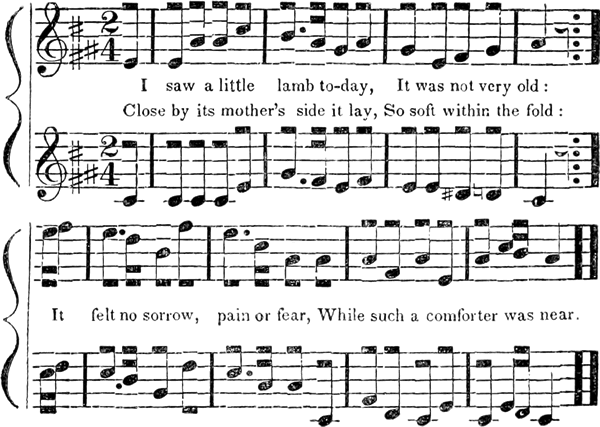
I saw a little lamb to-day,
It was not very old;
Close by its mother's side it lay,
So soft within the fold:
It felt no sorrow, pain, or fear,
While such a comforter was near.
Sweet little lamb, you cannot know
What blessing I have lost:
Were you like me, what could you do,
Amid the wintry frost?
My clothes are thin, my food is poor,
And I must beg from door to door.
I had a mother once, like you,
To keep me by her side:
She cherish'd me and lov'd me too;
But soon, alas! she died:
Now sorrowful and full of care,
I'm lone and weary every where.
My father was not kind to me,
He went away from home;
I long'd again his face to see,
But he would never come:
Before he died he would be found
Sleeping upon the naked ground.
I must not weep and break my heart,
They tell me not to grieve:
Sometimes I wish I could depart,
And find a peaceful grave:
They say such sorrows never come
To those who slumber in the tomb.
'Twas thus a little orphan sung,
Her lonely heart to cheer;
Before she wander'd very long,
She found a Savior near:
He bade her seek his smiling face
And find in heav'n a dwelling place.
[Pg 54]
THE ORPHAN.
O, if I were a robin,
I'd soon be on the wing,
I'd leave my sighs and sobbin'
And sweetly I would sing;
And early in each morning
I'd fly from tree to tree;
And going and returning
What pretty things I'd see?
But now I am so lonely,
I know not where to stay,
My little brother only
Is with me day by day:
My mother dear was crying
When father lay so low:
When she herself was dying—
I know not what to do.
Our parents are in heaven,
Their spirits went above;
Their sins were all forgiven,
For they the Lord did love:
God call'd them to forsake us,
And laid them in the dust;
But he himself will take us,
If in his name we trust.
If Jesus will receive us
Within his precious fold;
And when he'll please to give us
Some pretty wings of gold;
Then soon we will be flying
Up to that blessed place,
Where there is no more crying,
So near his smiling face.
[Pg 55]
THE PENITENT CHILD.

THE PENITENT CHILD.
A long time ago, when Janett was a child,
As thoughtless as others, as giddy and wild;
She was sent by her mistress one evening so fair,
Where a family circle were kneeling in prayer.
Her young heart was then touch'd, she would afterwards say—
"O! that my dear master but knew how to pray;"
For she had no father to pray for her soul,
No mother to counsel, advise, or control.
One night as the snows drifted deep through the vale,
While the bleak whistling wind was all dreary and chill,
She again sought the house where she first heard a pray'r,
And close to the door held her listening ear.
She heard, as the story of Jesus was read,
How he suffer'd below, how for sinners he bled;
Tears fell from her eyes like the drops of a show'r,
Till sobbings of anguish were heard at the door.
That night did the Lord, by his Spirit, impart,
To the penitent child a conversion of heart;
Then happy was she, though an orphan and poor,
And she never forgot how she knelt at the door.
B.
[Pg 56]
THE HEATHEN MOTHER.
See that heathen mother stand
Where the sacred currents flow,
With her own maternal hand,
Mid the waves her infant throw.
Hark! I hear the piteous scream,
Frightful monsters seize their prey:
Or the dark and bloody stream
Bears the struggling child away.
Fainter now, and fainter still,
Breaks the cry upon the ear;
But the mother's heart is steel;
She, unmov'd, that cry can hear.
Send, O send the Bible there,
Let its precepts reach the heart,
She may then her children spare—
Act the mother's tender part.
B.
- What is a heathen mother?
- What is meant by the sacred current?
- Why does she throw her infant into the river?
- What monsters of the deep seize infants?
- Why is the heathen mother so hard hearted?
- What would make her love her child?
- Would the Bible do her good without reading it?
- What would make its truths touch her heart?
- Why would she then spare her child?
[Pg 57]
THE BLOSSOM.
THE BLOSSOM.
Just now a fragile blossom grew,
Upon a lowly stem;
Its opening leaves disclos'd to view
A glitt'ring dewy gem.
Jane saw, and gently on her breast,
The tender flow'ret plac'd,
When lo! a rude and angry gust
Its beauties all effac'd.
Its leaves were scatter'd by the wind,
Its fragrance lost in air;
Till nothing there was left behind,
Of all that was so fair.
Young children, like this little flower,
Though beautiful and gay,
May in some sudden, mournful hour,
By death be borne away.
But the good child who loves to pray,
Whose sins are all forgiv'n,
Who loves the Savior's will t' obey,
May live and bloom in heav'n.
B.
[Pg 58]
BY THE SIDE OF A RIVER.
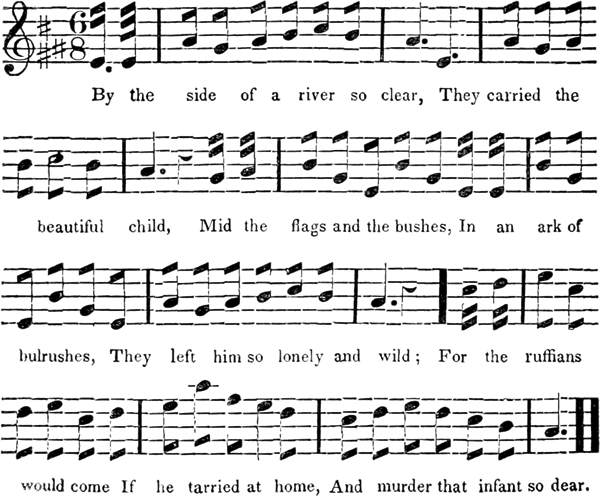
By the side of a river so clear,
They carried the beautiful child,
Mid the flags and the bushes,
In an ark of bulrushes,
They left him so lonely and wild;
For the ruffians would come
If he tarried at home,
And murder that infant so dear.
By the side of the river so clear,
The ladies were winding their path,
When Pharaoh's daughter
Stepp'd into the water
Her delicate person to bathe:
Before it was dark,
She open'd the ark,
And found a sweet infant was there.
By the side of the river so clear,
That infant was lonely and sad,
She took him in pity
And thought him so pretty,
[Pg 59]
And made little Moses so glad,
She call'd him her own—
Her beautiful son,
And sent for some nurse that was near.
Away from the river so clear,
They carried the beautiful child;
To his own tender mother
His sister and brother,
And then he look'd happy and smil'd.
His mother so good,
Did all that she could,
To nurse him and teach him with care.
Once more by that river so clear,
When Moses was aged and good;
He saw the king tremble,
Relent and dissemble,
And the waters all turning to blood
The king would abuse,
And trouble the Jews,
And turn to the Lord a deaf ear.
And soon by the sea that was red,
Stood Moses the servant of God;
While in him he confided,
The deep was divided,
As upward he lifted his rod.
The Jews safely cross'd,
While Pharaoh's host,
Were drown'd in the waters and dead.
And soon on a mountain so high,
Stood Moses, all trembling with awe;
Mid the lightnings and thunders,
And great signs and wonders,
For God was then giving his law.
The Lord wrote it down,
On two tables of stone,
Before he went back to the sky.
Once more on a mountain he stood,
The last one he ever might see;
The prospect was glorious,
Where Israel victorious,
Would soon over Jordan be free.
Then his labors did cease;
He departed in peace,
And now rests in the heav'nly abode.
Questions and details relating to the history of Moses, are very profitable
and instructive to children. Bible histories, well told, have a powerful influence
upon their minds.
[Pg 60]
VOICE OF SPRING.
Hark, hark, the voice of spring,
Woods and fields with echoes ring,
While the birds so sweetly sing;
Music floats
In joyous notes
From many a tuneful string.
Hark, hark, the voice of spring,
Busy bees are on the wing,
None but drones are slumbering:
Children too
Should learn to do
Every useful thing.
Hark, hark, the voice of spring,
From the flowers the breezes bring
Many a fragrant offering,
Emblem true
Of incense due
To Zion's glorious king.
Hark, hark, the voice of spring,
Trees their branches upward fling,
Vines unto their tendrils cling;
Infant bands
Lift up your hands,
Devoutly worshipping.
[Pg 61]
The music found in the preceding pages, may suffice in some measure for
training and exercising the voices of young children. Care should be taken
that the child pronounces his words with distinctness and precision. The
vowels also should be formed in the throat and not in the mouth or nose. The
manner of uttering the vowels, is that which gives a pleasant or unpleasant
tone of voice to the singer. Properly speaking, we are never to sing the consonants,
but to articulate them instantly, much as in speech, though louder and
with greater precision. We sing only the vowels, and hence our manner of
treating them is almost the only circumstance that gives sweetness and polish
to the voice.
The music which here follows, is not intended for drilling exercises. The
little songs or hymns are strictly devotional; and should as far as practicable,
be accompanied with devotional associations of thought and feeling. This is
a principle of unspeakable importance; and one that ought every where to
pervade the cultivation of devotional song.
NOW I LAY ME DOWN.
AT NIGHT.
Now I lay me down to sleep,
I pray the Lord my soul to keep,
If I should die before I wake,
I pray the Lord my soul to take.
Watts.
IN THE MORNING.
Through the night with slumber press'd,
The Lord hath giv'n me quiet rest;
Let mercy guide me through the day,
And lead me in the narrow way.
[Pg 62]
THE SUN HATH GONE TO REST.
EVENING.
The sun hath gone to rest,
The bee forsakes the flower,
The young bird slumbers in its nest,
Within the leafy bower.
Where have I been this day
Into what folly run?
Forgive me, Father, when I pray
Through Jesus Christ thy son.
When all my days are o'er,
And in the grave I lie;
Wilt thou permit my soul to soar,
To worlds beyond the sky.
L. H. S.
[Pg 63]
DARK NIGHT AWAY.
MORNING.
Dark night away hath roll'd,
Glad birds are soaring high,
The sun with rays of gold,
Looks from the dazzling sky.
Teach me to thank the power,
Whose hand sustains me so;
Who o'er each fragrant flower,
Bids dews of mercy flow.
O raise my heart above,
Where angel hosts adore;
I'll praise thee for thy love,
And count thy mercies o'er.
L. H. S.
[Pg 64]
THE TEMPEST.
THE TEMPEST.
The night is dark, the wind is high,
And rain is pouring from the sky,
There is no moon,
The stars are gone,
The lamps are out, the fire is down.
How sad and lonely is this night,
I cannot see a gleam of light;
Awake I keep,
And silent weep,
While parents dear are fast in sleep.
But there is one who dwells above,
Whose looks are bright, whose name is love,
His guardian care
Is every where,
And those who love him need not fear.
Such was the night in Galilee,
When the disciples on the sea,
Far from the coast,
By tempest tost,
Expected to be sunk and lost.
The Lord rebuk'd the angry seas,
And hush'd the winds and waves to peace,
He spake the word,
The tempest heard,
And own'd the pow'r of Christ the Lord.
Then let the rain in torrents pour,
And let the winds in tumult roar;
Dark be the night,
Yet Christ my light,
Around me shines in splendor bright.
[Pg 65]
AWAKE, AWAKE MY LOVE.
MORNING.
Awake, awake my love,
The Savior from above,
Would lend his gracious ear
To listen to your prayer,
Rise and unbosom every care.
Awake, awake my love,
The Savior from above,
In accents kind and mild,
Would own you as his child,
Though you're by nature all defil'd.
Awake, awake my love,
The Savior from above,
Can pardon all your sin,
And bid your soul be clean;
His blood can cleanse from every stain.
H. S. M.
[Pg 66]
AND NOW THE DAY IS ENDING.
EVENING.
And now the day is ending,
With all its toil and care:
My voice to heav'n ascending
Shall offer praise and prayer:
The Lord is ever mindful
Of those who seek his face;
And children weak and sinful,
May feel his saving grace.
For all my sin and folly,
This day from morn to e'en,
I pray the Lord most holy,
That I may be forgiv'n.
His bleeding love so precious,
I now recall to mind:
The Lord is ever gracious,
And pitiful and kind.
While I, my sins confessing,
Implore his pard'ning love;
I'll praise him for each blessing
Descending from above;
Ingratitude, so hateful—
O! keep me from that sin;
Lord make me truly grateful,
And cleanse my soul within.
[Pg 67]
HAPPY CHILD.
Happy, happy child am I,
On a mother's arms to lie,
Or to rest my weary head
On a soft and downy bed,
Beneath her gentle eye:
While she kneels beside me there,
Teaching me a holy pray'r.
But the little heathen child,
Naked, ignorant and wild,
Has no home or downy bed,
Where to rest his aching head,
Or mother's arms to shield.
She no prayer of love can say,
Heathen mothers will not pray.
Blessed Savior, now I see,
Thou art kinder far to me,
And I will not lay my head,
On my downy peaceful bed,
Till I have pray'd to thee;
Thank'd thee for a mother's care,
Such as heathen never share.
B.
[Pg 68]
THE STORM.
THE STORM.
How fierce the lightning blazes!
I hear the thunders roar;
Hark! how the wind arises!
While clouds their waters pour:
But in the Lord confiding
Our souls feel no alarm:
For he himself is riding
Upon the angry storm.
The lightnings are his arrows,
The thunders are his voice
Yet e'en the feeblest sparrows
May safe in him rejoice;
The clouds and winds and waters,
Obey his sovereign word;
Let Zion's sons and daughters
Adore th' Almighty Lord.
When lightnings red are streaking,
A Father's arm is bar'd;
When thunders loud are speaking,
A Father's voice is heard:
The foes that flee before him,
Can never feel his grace;
While children that adore him,
Shall see his smiling face.
[Pg 69]
LORD'S PRAYER.
THE LORD'S PRAYER.
Our Father, our Father in heav'n,
Be hallowed thy glorious name,
To thee let the kingdom be giv'n,
Thy will we acknowledge supreme.
We would by thy bounty be fed,
By infinite mercy forgiv'n;
Nor into temptation be led,
Or into sad evils be driv'n.
For thine is the kingdom, O Lord,
The power and the glory are thine,
Be forever and ever ador'd,
On earth as in heav'n divine.
[Pg 70]
SELF CONSECRATION.
SELF-CONSECRATION.
O, Jesus, delight of my soul,
My Savior, my Shepherd divine;
I yield to thy blessed control,
My body and spirit are thine;
Thy love I can never deserve,
That bids me be happy in thee;
My God and my King I will serve,
Whose favor is heaven to me.
How can I thy goodness repay,
By nature so weak and defil'd?
Myself I have given away;
O call me thine own little child:
And art thou my Father above?
Will Jesus abide in my heart?
O, bind me so fast with thy love,
That I never from thee shall depart.
[Pg 71]
CHILDREN, LISTEN.
Children, listen to the Lord,
And obey his gracious word,
Seek his love with heart and mind,
Early seek and you shall find.
Sorrowful, your sins confess,
Plead his perfect righteousness,
See the Savior's bleeding side!
Come, you will not be denied.
For his worship now prepare,
Kneel to him in fervent pray'r,
Serve him with a perfect heart,
Never from his ways depart.
[Pg 72]
HOSANNA.
Hosannas were by children sung,
When Jesus was on earth;
Then surely we are not too young
To sound his praises forth:
The Lord is great, the Lord is good;
He feeds us from his store,
With earthly and with heav'nly food,
We'll praise him evermore.
And when to him young children came,
He took them in his arms:
He bless'd them in his Father's name,
And spoke with heav'nly charms:
We thank him for his gracious word,
We thank him for his love:
We'll sing the praises of our Lord,
Who reigns in heav'n above.
Before he left this world of woe,
On Calvary he died;
His blood for us did freely flow
Forth from his wounded side;
O, then we'll magnify his name
Who groan'd and died for us;
We'll worship the atoning Lamb,
And kneel before his cross.
He rose again and walk'd abroad,
And many saw his face:
They call'd him the incarnate God,
Redeemer of our race:
He rose and he ascended high,
We'll bow to his command:
His glories fill the earth and sky,
He sits at God's right hand.
Obvious typographical errors were repaired, as listed below. Other
apparent archaic spellings, inconsistencies or errors have been retained.
Please note that some of the songs have incorrect or mismatched time
signatures or beats in the bar. These have been retained in the images
but have been silently altered in the midi representations of the music
using the set musical patterns as a guide. Please note that the tempi in
the transcriptions are guidelines, and should be adjusted to suit the
reader's purpose.
Included PNGs were created from scans from the original pages of the book.
Page 27, "litle" has been changed to "little". (Come, drive that long
sob from your dear little breast,...)
Page 28, "willl" has been changed to "will". (The winter is coming, then
what will you eat?)
Page 30, "thy" changed to "they". (... and off they fly.)
Page 32, "wont" changed to "won't". (Why won't he be kinder,...)
Page 33, "unwholsome" changed to "unwholesome". (They are unwholesome
too,...)
Page 52, "A A, C" changed to "A, B, C" for consistency. (I See nothing
but A, B, C.)
Page 57, "ope'ning" changed to "opening". (Its opening leaves disclos'd
to view)
Page 58, "." changed to ",". (By the side of a river so clear,...)
Page 70, the figures of dotted sixteenths with thirty-second notes have
been adjusted in the transcription to dotted eighths with sixteenth
notes.
End of Project Gutenberg's The Mother's Nursery Songs, by Thomas Hastings
*** END OF THIS PROJECT GUTENBERG EBOOK THE MOTHER'S NURSERY SONGS ***
***** This file should be named 42612-h.htm or 42612-h.zip *****
This and all associated files of various formats will be found in:
http://www.gutenberg.org/4/2/6/1/42612/
Produced by Veronika Redfern, David Edwards and the Online
Distributed Proofreading Team at http://www.pgdp.net (This
file was produced from images generously made available
by The Internet Archive). Music transcribed by Veronika
Redfern.
Updated editions will replace the previous one--the old editions
will be renamed.
Creating the works from public domain print editions means that no
one owns a United States copyright in these works, so the Foundation
(and you!) can copy and distribute it in the United States without
permission and without paying copyright royalties. Special rules,
set forth in the General Terms of Use part of this license, apply to
copying and distributing Project Gutenberg-tm electronic works to
protect the PROJECT GUTENBERG-tm concept and trademark. Project
Gutenberg is a registered trademark, and may not be used if you
charge for the eBooks, unless you receive specific permission. If you
do not charge anything for copies of this eBook, complying with the
rules is very easy. You may use this eBook for nearly any purpose
such as creation of derivative works, reports, performances and
research. They may be modified and printed and given away--you may do
practically ANYTHING with public domain eBooks. Redistribution is
subject to the trademark license, especially commercial
redistribution.
*** START: FULL LICENSE ***
THE FULL PROJECT GUTENBERG LICENSE
PLEASE READ THIS BEFORE YOU DISTRIBUTE OR USE THIS WORK
To protect the Project Gutenberg-tm mission of promoting the free
distribution of electronic works, by using or distributing this work
(or any other work associated in any way with the phrase "Project
Gutenberg"), you agree to comply with all the terms of the Full Project
Gutenberg-tm License available with this file or online at
www.gutenberg.org/license.
Section 1. General Terms of Use and Redistributing Project Gutenberg-tm
electronic works
1.A. By reading or using any part of this Project Gutenberg-tm
electronic work, you indicate that you have read, understand, agree to
and accept all the terms of this license and intellectual property
(trademark/copyright) agreement. If you do not agree to abide by all
the terms of this agreement, you must cease using and return or destroy
all copies of Project Gutenberg-tm electronic works in your possession.
If you paid a fee for obtaining a copy of or access to a Project
Gutenberg-tm electronic work and you do not agree to be bound by the
terms of this agreement, you may obtain a refund from the person or
entity to whom you paid the fee as set forth in paragraph 1.E.8.
1.B. "Project Gutenberg" is a registered trademark. It may only be
used on or associated in any way with an electronic work by people who
agree to be bound by the terms of this agreement. There are a few
things that you can do with most Project Gutenberg-tm electronic works
even without complying with the full terms of this agreement. See
paragraph 1.C below. There are a lot of things you can do with Project
Gutenberg-tm electronic works if you follow the terms of this agreement
and help preserve free future access to Project Gutenberg-tm electronic
works. See paragraph 1.E below.
1.C. The Project Gutenberg Literary Archive Foundation ("the Foundation"
or PGLAF), owns a compilation copyright in the collection of Project
Gutenberg-tm electronic works. Nearly all the individual works in the
collection are in the public domain in the United States. If an
individual work is in the public domain in the United States and you are
located in the United States, we do not claim a right to prevent you from
copying, distributing, performing, displaying or creating derivative
works based on the work as long as all references to Project Gutenberg
are removed. Of course, we hope that you will support the Project
Gutenberg-tm mission of promoting free access to electronic works by
freely sharing Project Gutenberg-tm works in compliance with the terms of
this agreement for keeping the Project Gutenberg-tm name associated with
the work. You can easily comply with the terms of this agreement by
keeping this work in the same format with its attached full Project
Gutenberg-tm License when you share it without charge with others.
1.D. The copyright laws of the place where you are located also govern
what you can do with this work. Copyright laws in most countries are in
a constant state of change. If you are outside the United States, check
the laws of your country in addition to the terms of this agreement
before downloading, copying, displaying, performing, distributing or
creating derivative works based on this work or any other Project
Gutenberg-tm work. The Foundation makes no representations concerning
the copyright status of any work in any country outside the United
States.
1.E. Unless you have removed all references to Project Gutenberg:
1.E.1. The following sentence, with active links to, or other immediate
access to, the full Project Gutenberg-tm License must appear prominently
whenever any copy of a Project Gutenberg-tm work (any work on which the
phrase "Project Gutenberg" appears, or with which the phrase "Project
Gutenberg" is associated) is accessed, displayed, performed, viewed,
copied or distributed:
This eBook is for the use of anyone anywhere at no cost and with
almost no restrictions whatsoever. You may copy it, give it away or
re-use it under the terms of the Project Gutenberg License included
with this eBook or online at www.gutenberg.org
1.E.2. If an individual Project Gutenberg-tm electronic work is derived
from the public domain (does not contain a notice indicating that it is
posted with permission of the copyright holder), the work can be copied
and distributed to anyone in the United States without paying any fees
or charges. If you are redistributing or providing access to a work
with the phrase "Project Gutenberg" associated with or appearing on the
work, you must comply either with the requirements of paragraphs 1.E.1
through 1.E.7 or obtain permission for the use of the work and the
Project Gutenberg-tm trademark as set forth in paragraphs 1.E.8 or
1.E.9.
1.E.3. If an individual Project Gutenberg-tm electronic work is posted
with the permission of the copyright holder, your use and distribution
must comply with both paragraphs 1.E.1 through 1.E.7 and any additional
terms imposed by the copyright holder. Additional terms will be linked
to the Project Gutenberg-tm License for all works posted with the
permission of the copyright holder found at the beginning of this work.
1.E.4. Do not unlink or detach or remove the full Project Gutenberg-tm
License terms from this work, or any files containing a part of this
work or any other work associated with Project Gutenberg-tm.
1.E.5. Do not copy, display, perform, distribute or redistribute this
electronic work, or any part of this electronic work, without
prominently displaying the sentence set forth in paragraph 1.E.1 with
active links or immediate access to the full terms of the Project
Gutenberg-tm License.
1.E.6. You may convert to and distribute this work in any binary,
compressed, marked up, nonproprietary or proprietary form, including any
word processing or hypertext form. However, if you provide access to or
distribute copies of a Project Gutenberg-tm work in a format other than
"Plain Vanilla ASCII" or other format used in the official version
posted on the official Project Gutenberg-tm web site (www.gutenberg.org),
you must, at no additional cost, fee or expense to the user, provide a
copy, a means of exporting a copy, or a means of obtaining a copy upon
request, of the work in its original "Plain Vanilla ASCII" or other
form. Any alternate format must include the full Project Gutenberg-tm
License as specified in paragraph 1.E.1.
1.E.7. Do not charge a fee for access to, viewing, displaying,
performing, copying or distributing any Project Gutenberg-tm works
unless you comply with paragraph 1.E.8 or 1.E.9.
1.E.8. You may charge a reasonable fee for copies of or providing
access to or distributing Project Gutenberg-tm electronic works provided
that
- You pay a royalty fee of 20% of the gross profits you derive from
the use of Project Gutenberg-tm works calculated using the method
you already use to calculate your applicable taxes. The fee is
owed to the owner of the Project Gutenberg-tm trademark, but he
has agreed to donate royalties under this paragraph to the
Project Gutenberg Literary Archive Foundation. Royalty payments
must be paid within 60 days following each date on which you
prepare (or are legally required to prepare) your periodic tax
returns. Royalty payments should be clearly marked as such and
sent to the Project Gutenberg Literary Archive Foundation at the
address specified in Section 4, "Information about donations to
the Project Gutenberg Literary Archive Foundation."
- You provide a full refund of any money paid by a user who notifies
you in writing (or by e-mail) within 30 days of receipt that s/he
does not agree to the terms of the full Project Gutenberg-tm
License. You must require such a user to return or
destroy all copies of the works possessed in a physical medium
and discontinue all use of and all access to other copies of
Project Gutenberg-tm works.
- You provide, in accordance with paragraph 1.F.3, a full refund of any
money paid for a work or a replacement copy, if a defect in the
electronic work is discovered and reported to you within 90 days
of receipt of the work.
- You comply with all other terms of this agreement for free
distribution of Project Gutenberg-tm works.
1.E.9. If you wish to charge a fee or distribute a Project Gutenberg-tm
electronic work or group of works on different terms than are set
forth in this agreement, you must obtain permission in writing from
both the Project Gutenberg Literary Archive Foundation and Michael
Hart, the owner of the Project Gutenberg-tm trademark. Contact the
Foundation as set forth in Section 3 below.
1.F.
1.F.1. Project Gutenberg volunteers and employees expend considerable
effort to identify, do copyright research on, transcribe and proofread
public domain works in creating the Project Gutenberg-tm
collection. Despite these efforts, Project Gutenberg-tm electronic
works, and the medium on which they may be stored, may contain
"Defects," such as, but not limited to, incomplete, inaccurate or
corrupt data, transcription errors, a copyright or other intellectual
property infringement, a defective or damaged disk or other medium, a
computer virus, or computer codes that damage or cannot be read by
your equipment.
1.F.2. LIMITED WARRANTY, DISCLAIMER OF DAMAGES - Except for the "Right
of Replacement or Refund" described in paragraph 1.F.3, the Project
Gutenberg Literary Archive Foundation, the owner of the Project
Gutenberg-tm trademark, and any other party distributing a Project
Gutenberg-tm electronic work under this agreement, disclaim all
liability to you for damages, costs and expenses, including legal
fees. YOU AGREE THAT YOU HAVE NO REMEDIES FOR NEGLIGENCE, STRICT
LIABILITY, BREACH OF WARRANTY OR BREACH OF CONTRACT EXCEPT THOSE
PROVIDED IN PARAGRAPH 1.F.3. YOU AGREE THAT THE FOUNDATION, THE
TRADEMARK OWNER, AND ANY DISTRIBUTOR UNDER THIS AGREEMENT WILL NOT BE
LIABLE TO YOU FOR ACTUAL, DIRECT, INDIRECT, CONSEQUENTIAL, PUNITIVE OR
INCIDENTAL DAMAGES EVEN IF YOU GIVE NOTICE OF THE POSSIBILITY OF SUCH
DAMAGE.
1.F.3. LIMITED RIGHT OF REPLACEMENT OR REFUND - If you discover a
defect in this electronic work within 90 days of receiving it, you can
receive a refund of the money (if any) you paid for it by sending a
written explanation to the person you received the work from. If you
received the work on a physical medium, you must return the medium with
your written explanation. The person or entity that provided you with
the defective work may elect to provide a replacement copy in lieu of a
refund. If you received the work electronically, the person or entity
providing it to you may choose to give you a second opportunity to
receive the work electronically in lieu of a refund. If the second copy
is also defective, you may demand a refund in writing without further
opportunities to fix the problem.
1.F.4. Except for the limited right of replacement or refund set forth
in paragraph 1.F.3, this work is provided to you 'AS-IS', WITH NO OTHER
WARRANTIES OF ANY KIND, EXPRESS OR IMPLIED, INCLUDING BUT NOT LIMITED TO
WARRANTIES OF MERCHANTABILITY OR FITNESS FOR ANY PURPOSE.
1.F.5. Some states do not allow disclaimers of certain implied
warranties or the exclusion or limitation of certain types of damages.
If any disclaimer or limitation set forth in this agreement violates the
law of the state applicable to this agreement, the agreement shall be
interpreted to make the maximum disclaimer or limitation permitted by
the applicable state law. The invalidity or unenforceability of any
provision of this agreement shall not void the remaining provisions.
1.F.6. INDEMNITY - You agree to indemnify and hold the Foundation, the
trademark owner, any agent or employee of the Foundation, anyone
providing copies of Project Gutenberg-tm electronic works in accordance
with this agreement, and any volunteers associated with the production,
promotion and distribution of Project Gutenberg-tm electronic works,
harmless from all liability, costs and expenses, including legal fees,
that arise directly or indirectly from any of the following which you do
or cause to occur: (a) distribution of this or any Project Gutenberg-tm
work, (b) alteration, modification, or additions or deletions to any
Project Gutenberg-tm work, and (c) any Defect you cause.
Section 2. Information about the Mission of Project Gutenberg-tm
Project Gutenberg-tm is synonymous with the free distribution of
electronic works in formats readable by the widest variety of computers
including obsolete, old, middle-aged and new computers. It exists
because of the efforts of hundreds of volunteers and donations from
people in all walks of life.
Volunteers and financial support to provide volunteers with the
assistance they need are critical to reaching Project Gutenberg-tm's
goals and ensuring that the Project Gutenberg-tm collection will
remain freely available for generations to come. In 2001, the Project
Gutenberg Literary Archive Foundation was created to provide a secure
and permanent future for Project Gutenberg-tm and future generations.
To learn more about the Project Gutenberg Literary Archive Foundation
and how your efforts and donations can help, see Sections 3 and 4
and the Foundation information page at www.gutenberg.org
Section 3. Information about the Project Gutenberg Literary Archive
Foundation
The Project Gutenberg Literary Archive Foundation is a non profit
501(c)(3) educational corporation organized under the laws of the
state of Mississippi and granted tax exempt status by the Internal
Revenue Service. The Foundation's EIN or federal tax identification
number is 64-6221541. Contributions to the Project Gutenberg
Literary Archive Foundation are tax deductible to the full extent
permitted by U.S. federal laws and your state's laws.
The Foundation's principal office is located at 4557 Melan Dr. S.
Fairbanks, AK, 99712., but its volunteers and employees are scattered
throughout numerous locations. Its business office is located at 809
North 1500 West, Salt Lake City, UT 84116, (801) 596-1887. Email
contact links and up to date contact information can be found at the
Foundation's web site and official page at www.gutenberg.org/contact
For additional contact information:
Dr. Gregory B. Newby
Chief Executive and Director
[email protected]
Section 4. Information about Donations to the Project Gutenberg
Literary Archive Foundation
Project Gutenberg-tm depends upon and cannot survive without wide
spread public support and donations to carry out its mission of
increasing the number of public domain and licensed works that can be
freely distributed in machine readable form accessible by the widest
array of equipment including outdated equipment. Many small donations
($1 to $5,000) are particularly important to maintaining tax exempt
status with the IRS.
The Foundation is committed to complying with the laws regulating
charities and charitable donations in all 50 states of the United
States. Compliance requirements are not uniform and it takes a
considerable effort, much paperwork and many fees to meet and keep up
with these requirements. We do not solicit donations in locations
where we have not received written confirmation of compliance. To
SEND DONATIONS or determine the status of compliance for any
particular state visit www.gutenberg.org/donate
While we cannot and do not solicit contributions from states where we
have not met the solicitation requirements, we know of no prohibition
against accepting unsolicited donations from donors in such states who
approach us with offers to donate.
International donations are gratefully accepted, but we cannot make
any statements concerning tax treatment of donations received from
outside the United States. U.S. laws alone swamp our small staff.
Please check the Project Gutenberg Web pages for current donation
methods and addresses. Donations are accepted in a number of other
ways including checks, online payments and credit card donations.
To donate, please visit: www.gutenberg.org/donate
Section 5. General Information About Project Gutenberg-tm electronic
works.
Professor Michael S. Hart was the originator of the Project Gutenberg-tm
concept of a library of electronic works that could be freely shared
with anyone. For forty years, he produced and distributed Project
Gutenberg-tm eBooks with only a loose network of volunteer support.
Project Gutenberg-tm eBooks are often created from several printed
editions, all of which are confirmed as Public Domain in the U.S.
unless a copyright notice is included. Thus, we do not necessarily
keep eBooks in compliance with any particular paper edition.
Most people start at our Web site which has the main PG search facility:
www.gutenberg.org
This Web site includes information about Project Gutenberg-tm,
including how to make donations to the Project Gutenberg Literary
Archive Foundation, how to help produce our new eBooks, and how to
subscribe to our email newsletter to hear about new eBooks.







































